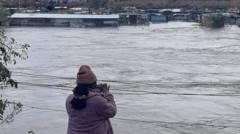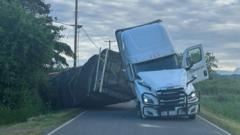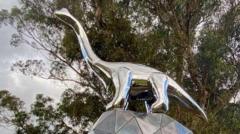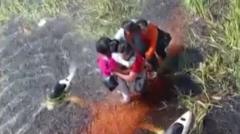A recent strand of pilot whales on a North Island beach has sparked a remarkable rescue operation, highlighting both the enduring challenges of marine life conservation and the collective spirit of community involvement.
Rescue Mission Saves Over 30 Pilot Whales from Stranding in New Zealand
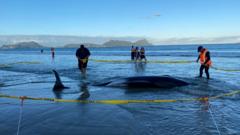
Rescue Mission Saves Over 30 Pilot Whales from Stranding in New Zealand
Community and conservationists unite in successful effort to refloat pilot whales at Ruakākā Beach.
On Sunday, the New Zealand Department of Conservation reported a successful rescue of more than 30 pilot whales stranded on Ruakākā Beach, located near Whangārei. Despite the tragic loss of three adults and one calf, the majority of the pod was successfully refloated and swam back into deeper waters. Fortunately, no re-strandings were reported during the night.
Lead by the local Māori group Patuharakeke, the rescue action drew support from authorities, marine rescue organizations, and many community volunteers, illustrating a strong communal response to the unfortunate event. Whale strandings, particularly frequent in New Zealand, present a puzzling natural occurrence that often results in mass casualties.
The whales were refloated using sheets to lift them back to safety, while Patuharakeke members ensured their ongoing vigilance throughout the night to prevent any further incidents. Joel Lauterbach, operations manager for the Department of Conservation, commended the collaborative effort, calling it "incredible." He expressed gratitude towards all involved, including Project Jonah, an organization dedicated to aiding stranded marine mammals, as well as the hundreds of individuals who joined the mission.
Strandings of whales and dolphins are relatively common in New Zealand, with the DOC responding to an average of about 85 cases each year, mostly involving solitary animals. Such events raise critical questions about the factors leading to these occurrences and highlight the need for ongoing conservation efforts to protect marine wildlife.
Lead by the local Māori group Patuharakeke, the rescue action drew support from authorities, marine rescue organizations, and many community volunteers, illustrating a strong communal response to the unfortunate event. Whale strandings, particularly frequent in New Zealand, present a puzzling natural occurrence that often results in mass casualties.
The whales were refloated using sheets to lift them back to safety, while Patuharakeke members ensured their ongoing vigilance throughout the night to prevent any further incidents. Joel Lauterbach, operations manager for the Department of Conservation, commended the collaborative effort, calling it "incredible." He expressed gratitude towards all involved, including Project Jonah, an organization dedicated to aiding stranded marine mammals, as well as the hundreds of individuals who joined the mission.
Strandings of whales and dolphins are relatively common in New Zealand, with the DOC responding to an average of about 85 cases each year, mostly involving solitary animals. Such events raise critical questions about the factors leading to these occurrences and highlight the need for ongoing conservation efforts to protect marine wildlife.





